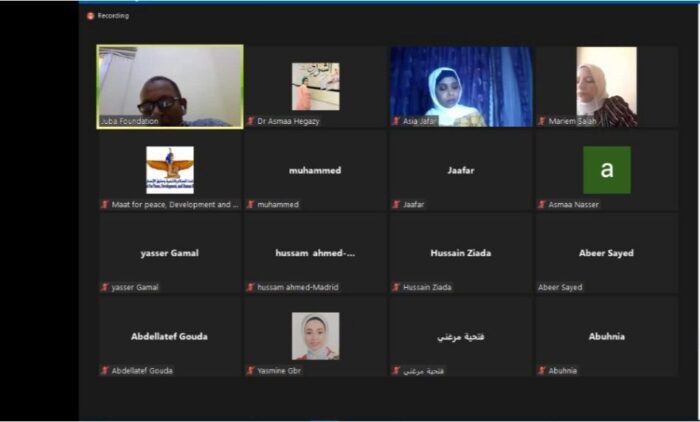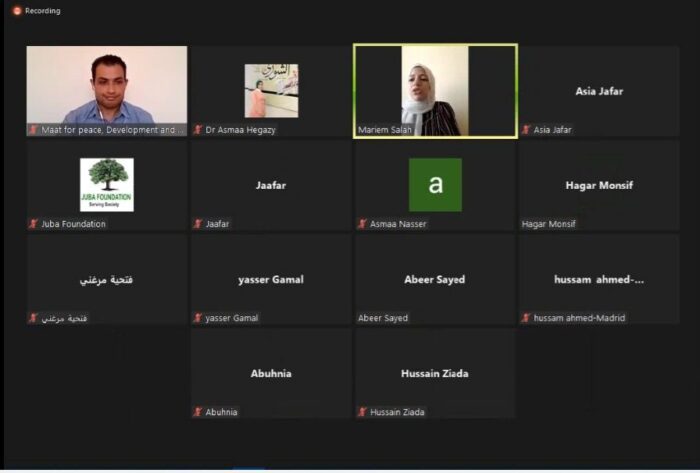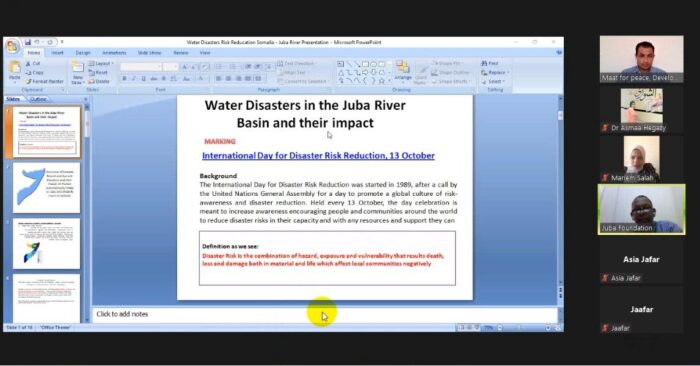Salah: There is an urgent need to adhere to the 2015 Sendai Framework for Action to reduce the impact of water-related disasters
“Al-Jaafari”: The absence of a good and effective management of the GERD can lead to a disaster in the Nile Basin
“Abdi”: Ethiopia's intention to build dams at the source of the Juba and Shebelle rivers will reduce the water flow into Somalia
On the sidelines of the International Day for Disaster Risk Reduction, a number of African experts from Egypt, Sudan and Somalia have stated that the unilateral Ethiopian measures on watercourses can lead to a "regional disaster" in North and East Africa. Maat for Peace, Development and Human Rights, in cooperation with the Juba Foundation of Somalia and Azza Center for Professional Media in Sudan, organized a virtual session (webinar), building on the major collective challenges faced by Africa, especially those related to disasters and their impact on the fundamental human rights, topped by the right to water as a limited natural resource and as a prerequisite for the realization of other human rights.
In this context, Mariam Salah, a researcher at the African Affairs and Sustainable Development Unit at Maat, presented a historical and legal background on the International Day for Disaster Risk Reduction, which is celebrated on October 13 of each year, to monitor the progress made by countries with regard to disaster reduction and to promote an understanding of how to minimize their risks, which is emphasized by the 2015 Sendai Framework and its seven objectives. Salah pointed out that all the objectives of the "Sendai" Framework are linked to the regional and global problems related to water, including water poverty. She recommended the need for the re-implementation of the Sendai Framework and for the obligation to introduce and harmonize programs and activities consistent with such framework, particularly its objective of enhancing individual awareness of disaster reduction. This is in addition to promoting the establishment of an African control mechanism aimed at measuring the progress made by African countries in this regard.

Moreover, Asia al-Jaafari, Executive Director of Azza Center for Professional Media in Sudan, referred to the relation between disasters and water poverty by focusing on the situation in Africa. She defined disasters as a destruction caused by natural or human actions stressing that Africa suffers from poverty, which compounds the effects of disasters on it. With regard to the Grand Ethiopian Renaissance Dam (GERD), she explained the importance of a good and effective management of the GERD issue, whether with regard to the filling process or other uses. In addition, the poor management of the GERD will lead to a disaster in the Nile Basin. In the framework of stressing the need for an accurate transmission of information, Al-Jaafari recommended journalists in particular to report information transparently and honestly, so as not cause any man-made disasters.
Ahmed Abdi, a representative of the Somali Juba Foundation, highlighted the water disasters in the Juba and Shebelle river basins and their impact on the fundamental human rights in Somalia. He pointed out that Somalia has been experiencing the longest man-made disaster, which is the Somali civil war, for nearly three and a half decades. This war has resulted in the displacement of a large number of Somali people and internal divisions, leading to prevalence rates of poverty and other crimes. Abdi also stated that the Juba and Shebelle rivers have a significant impact on the social, economic and political aspects of Somalia, due to its geographical location. He explained that if Ethiopia unilaterally decided to build dams near the source of the two rivers, the water flow into Somalia would be automatically reduced or halted, which will directly affect the lives of millions of Somali people. Ahmed pointed out the need for the civil society to increase events and activities for reducing disasters and raising awareness of the procedures to be followed and not to rely on politicians alone to do so.

Notably, Africa is among the issues of concern to Maat for Peace, Development and Human rights, being a member of the General Assembly for the Economic, Social & Cultural Council (ECOSOCC) of the Africa Union (AU). Moreover, Maat serves as an Observer in The African Commission on Human and People’s Rights (ACHPR) and as a Northern African Coordinator in the major Non-Governmental Organizations (NGOs) in Africa of the United Nations Department of Economic and Social Affairs (UN DESA).
.
shortlink: https://maatpeace.org/en/?p=33902












